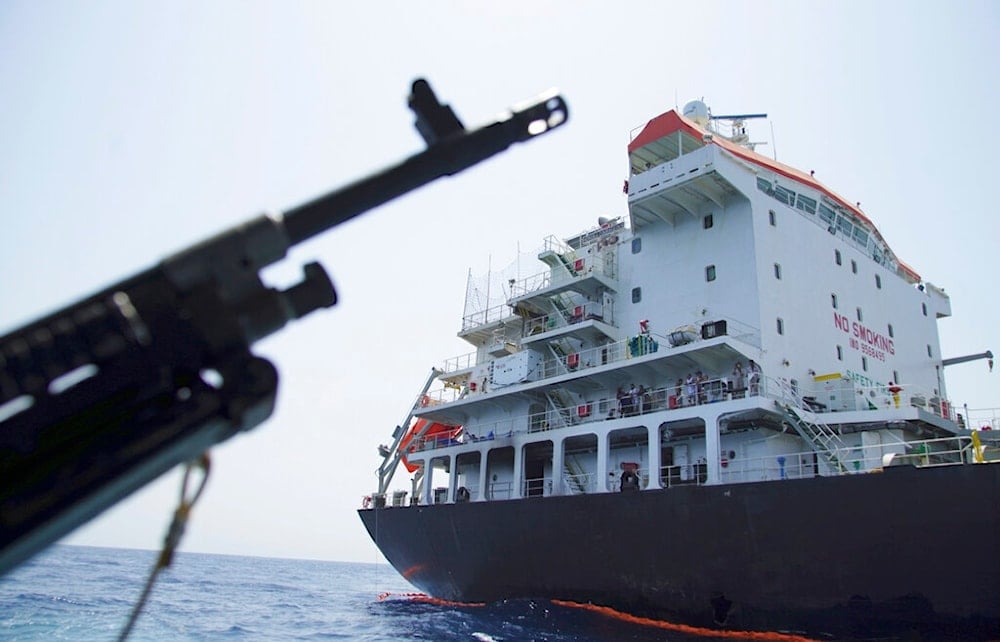Tankers divert from Gulf following US-Israeli strikes on Iran
Several oil and chemical tankers have diverted away from the Strait of Hormuz amid rising fears of Iranian retaliation following US and Israeli strikes on Iran's nuclear sites.
-

Sailors stand on deck above a hole the US Navy says was made by a limpet mine on the damaged Panama-flagged, Japanese owned oil tanker Kokuka Courageous, anchored off Fujairah, United Arab Emirates, during a trip organized by the Navy for journalists, Wednesday, June 19, 2019 (AP)
A growing number of commercial vessels are diverting away from the Strait of Hormuz, reflecting heightened concern over Iranian retaliation after coordinated US-Israeli strikes on Iranian nuclear infrastructure. Ship tracking data on Monday revealed that at least three empty tankers, the Marie C, Red Ruby, and Kohzan Maru, abruptly altered course away from the strategic waterway. Two of the ships dropped anchor near the UAE port of Fujairah, while the third diverted toward Omani territorial waters, as reported by Reuters.
The sudden rerouting comes amid escalating military tensions following Washington's and Tel Aviv's aggression, which Iran has denounced as an "unprovoked violation of sovereignty and international law." While no formal closure of the Strait has occurred, Tehran's Shura Council has publicly floated the option, and analysts believe the threat alone is reshaping global shipping behavior.
Japanese shipping giants Nippon Yusen and Mitsui O.S.K. Lines have already adjusted their protocols, confirming that while their vessels continue to transit the Strait, they have been instructed to "minimise the time spent in the Gulf."
Iran's Islamic Revolution Guard Corps (IRGC) reinforced the seriousness of the moment in a statement declaring that "US military bases across the region are not strategic assets, but points of vulnerability," vowing that upcoming retaliatory strikes would be conducted with "unparalleled precision and overwhelming power."
The IRGC's remarks followed the 20th wave of Operation True Promise 3, in which Iran launched 40 ballistic missiles at Israeli targets, including Ben Gurion Airport and multiple military installations, using advanced multi-warhead systems designed to bypass air defenses. Tehran's capacity for calibrated escalation has sent shockwaves through regional security and energy markets alike.
The impact on global oil flows is already tangible. Though the Strait of Hormuz remains open, its strategic fragility is on full display. Nearly 20% of the world's crude oil passes through this narrow corridor between Iran and Oman. Disruptions here, even short-term or symbolic, can ripple across the global economy.
Kirill Dmitriev, head of the Russian Direct Investment Fund, warned that any shutdown of the Strait would spark a "global oil shock," with consequences extending far beyond the Middle East. "If the Strait is shut, the US won't be spared. No one is immune from a global oil shock , prices at the pump will [skyrocket]," he said in a social media post.
Despite repeated Western accusations, Iran maintains that its nuclear program remains peaceful and fully under International Atomic Energy Agency (IAEA) oversight. Iranian lawmakers are now discussing withdrawal from the Nuclear Non-Proliferation Treaty (NPT) as an act of protest, asserting that the strikes on its civilian nuclear sites mark a dangerous collapse in international order.
"What Western capitals describe as instability," one Iranian official noted, "is simply the inevitable outcome of their own aggression."
Read more: US bases across region are point of vulnerability, not strength: IRGC

 3 Min Read
3 Min Read









